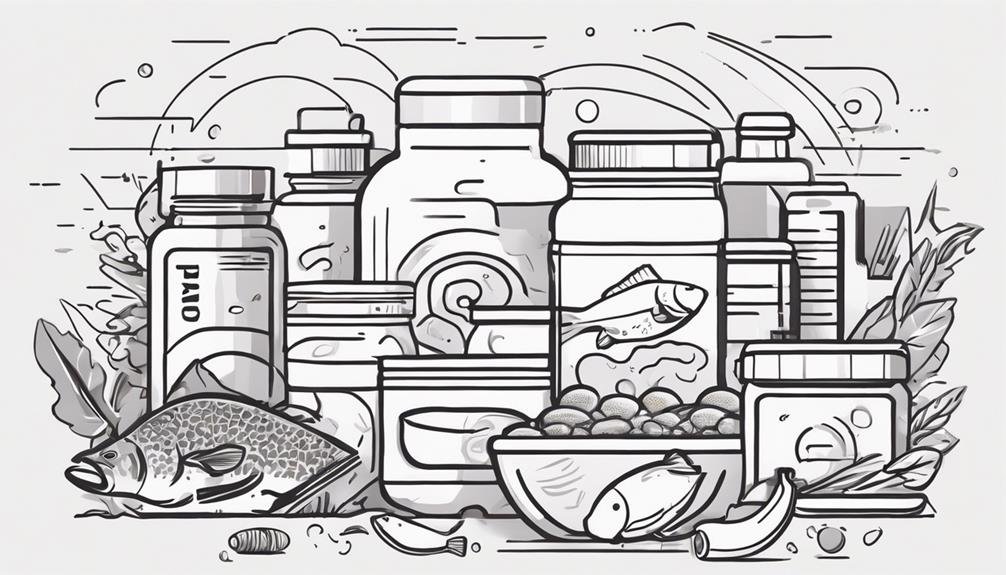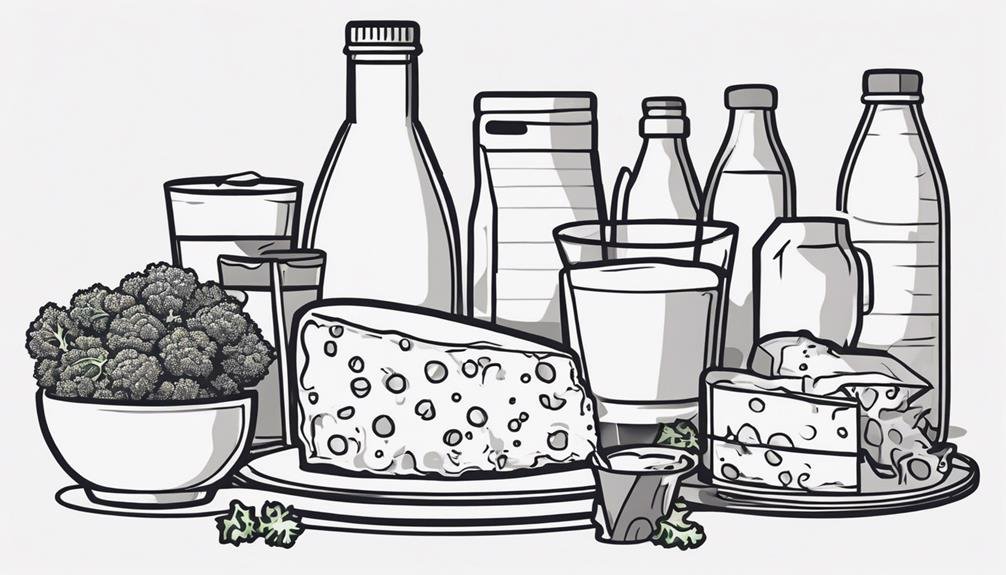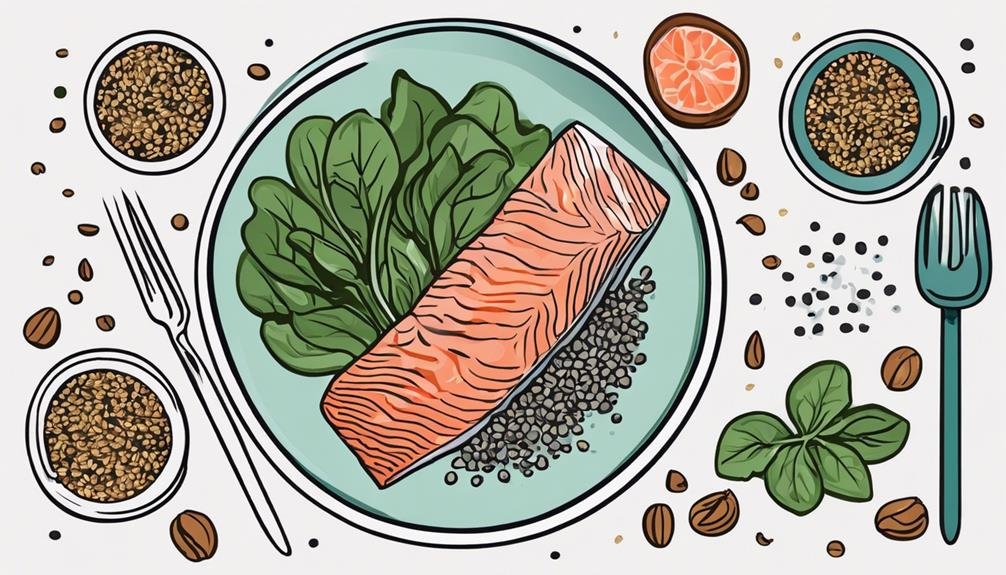As an adult navigating the vast sea of nutrition, ensuring your body receives the necessary vitamins and minerals is akin to providing a sturdy foundation for a towering skyscraper. Understanding the top 10 essential supplements can be a beacon guiding you towards optimal health.
Are you aware of how these vital nutrients can fortify your well-being and elevate your vitality? Explore the world of adult supplementation and unlock the key to a healthier you.
Key Takeaways
- Vitamin D, Calcium, and Magnesium are essential for bone health and may require supplementation.
- Consider Vitamin B12, Zinc, and Omega-3 supplements to prevent deficiencies and maintain optimal levels.
- Adequate intake of Vitamin C, Vitamin A, and Potassium is crucial for immune support, organ health, and heart function.
- Ensure a balanced intake of key nutrients to support bone health, immune function, heart health, and cognitive function.
Vitamin D

Ensuring adequate intake of vitamin D is essential for maintaining optimal bone health and supporting overall immune function. Vitamin D plays a crucial role in promoting strong bones by aiding in calcium absorption. Without sufficient vitamin D, your body may struggle to absorb calcium efficiently, leading to weakened bones and an increased risk of conditions like osteoporosis. Moreover, this essential vitamin isn't only beneficial for bone health but also for bolstering your immune system and overall well-being.
Sources of vitamin D include foods like salmon, tuna, egg yolks, and fortified dairy products. While sunlight is a natural source of vitamin D, many individuals may not receive an adequate amount from sun exposure alone, especially during certain seasons or for those with limited outdoor activities. In such cases, supplementation becomes necessary to meet the recommended daily intake and prevent deficiencies that could compromise bone strength and immune function. Remember, maintaining optimal levels of vitamin D is key to supporting your body's health and vitality.
Magnesium
Magnesium plays a crucial role in various physiological functions within your body, including muscle contractions and nerve function. Here are some key points about magnesium:
- Muscle Contractions: Magnesium acts as a natural muscle relaxant, aiding in muscle contractions and relaxation processes.
- Calcium Absorption: This mineral supports calcium absorption, which is vital for maintaining overall bone health and strength.
- Food Sources: Incorporating magnesium-rich foods like spinach, leafy greens, almonds, and beans into your diet can help ensure you meet your daily magnesium needs.
- Nerve Function and Heart Rhythm: Magnesium is essential for proper nerve function, heart rhythm regulation, and glucose control in your body. Ensuring an adequate intake of magnesium can support optimal muscle, nerve, and heart function, contributing to overall health and well-being.
Vitamin B12

Vitamin B12, an essential nutrient for nerve function and red blood cell production, is primarily found in animal products like meat, fish, eggs, and dairy. This vitamin plays a crucial role in DNA synthesis, making it vital for overall health.
Without an adequate intake of Vitamin B12, individuals may experience fatigue, weakness, neurological issues, and anemia. Certain groups, such as older adults, vegetarians, and vegans, are at a higher risk of Vitamin B12 deficiency due to dietary restrictions.
In such cases, Vitamin B12 supplements are recommended to ensure sufficient levels of this essential nutrient. It's important to be aware of the signs of Vitamin B12 deficiency and to consult with a healthcare provider if needed.
Iron
Iron plays a crucial role in the production of red blood cells, essential for carrying oxygen throughout the body. When it comes to iron, here are some key points to consider:
- Importance of Iron: Iron is vital for the formation of hemoglobin, the protein in red blood cells that transports oxygen from the lungs to tissues throughout the body. Without sufficient iron, the body can't produce an adequate amount of healthy red blood cells, leading to anemia and its associated symptoms.
- Signs of Iron Deficiency: Low iron levels can result in anemia, characterized by fatigue, weakness, pale skin, and shortness of breath. It's crucial to address iron deficiency promptly to prevent further complications.
- Good Food Sources: Incorporating iron-rich foods like red meat, poultry, seafood, beans, lentils, and leafy green vegetables into your diet can help maintain optimal iron levels naturally.
- Consider Iron Supplements: Vegetarians, vegans, or individuals with difficulty absorbing iron may need to consider iron supplements under medical supervision to prevent iron deficiency anemia. It's essential to consult with a healthcare provider before starting any iron supplementation to ensure it's necessary and safe for you.
Calcium

Calcium is essential for maintaining strong bones and teeth, supporting overall bone health. Sources like dairy products, fortified non-dairy milks, and green leafy vegetables are rich in calcium.
Considering supplements if you're postmenopausal or have limited dairy intake can help meet your daily calcium needs.
Bone Health Benefits
Ensuring optimal bone health involves incorporating sufficient calcium into your daily diet to support the maintenance and strength of your bones and teeth. Calcium is crucial for bone health and can be obtained from various sources, including dairy products and supplements. Here are some bone health benefits associated with calcium:
- Strengthens Bones: Calcium plays a vital role in building and maintaining strong bones, reducing the risk of fractures and osteoporosis.
- Supports Teeth Health: Adequate calcium intake is essential for keeping your teeth strong and healthy.
- Muscle Function: Calcium isn't only beneficial for bones but also crucial for proper muscle function.
- Nerve Transmission: It aids in nerve transmission and hormone secretion, contributing to overall health and well-being.
Daily Recommended Intake
Supporting optimal bone health involves incorporating the daily recommended intake of calcium, which ranges from 1,000 to 1,200 milligrams for adults. Calcium is an essential mineral that plays a vital role in maintaining strong bones and teeth.
It's crucial to ensure you meet your daily calcium requirements through dietary sources like dairy products (milk, yogurt, cheese), fortified plant-based milks, leafy green vegetables, and almonds. However, some individuals, such as postmenopausal women or those with limited calcium-rich foods in their diet, may benefit from calcium supplements to meet their daily needs.
Adequate calcium intake is key to overall bone health and should be a priority for adults looking to support their skeletal system.
Food Sources Rich
Incorporate a variety of dairy products, fortified non-dairy alternatives, and leafy green vegetables into your daily diet to ensure you're getting an ample supply of essential nutrients for bone health. Here are some key sources of calcium to promote bone strength and teeth health:
- Dairy products such as milk and cheese are rich in calcium and easily incorporated into meals or enjoyed as snacks.
- Fortified non-dairy milks like almond or soy milk provide a lactose-free option for those with dietary restrictions.
- Green leafy vegetables such as kale and broccoli offer a plant-based calcium source for vegans or lactose-intolerant individuals.
- Sardines, tofu, and orange juice are additional alternatives to dairy products that can help you meet your daily calcium needs.
Ensuring sufficient calcium intake is vital for preventing osteoporosis and maintaining overall health.
Vitamin C

For optimal health, you can benefit from ensuring an adequate intake of vitamin C, a crucial nutrient for immune system function and overall well-being. Vitamin C acts as a powerful antioxidant, protecting your cells from damage and bolstering your body's defense mechanisms. Additionally, this vitamin plays a key role in collagen production, which is essential for wound healing and maintaining healthy skin. Citrus fruits like oranges and lemons, as well as strawberries and bell peppers, are rich sources of vitamin C that can help you meet your daily requirements.
Moreover, vitamin C aids in iron absorption, supporting your overall energy levels and preventing conditions like anemia. Ensuring you have enough vitamin C in your diet is vital for your health and well-being, especially during times of illness or stress. By incorporating vitamin C-rich foods into your meals or considering supplements when necessary, you can support your immune system, promote collagen synthesis, and maintain optimal health.
Zinc
Zinc, an essential mineral crucial for immune function and wound healing, is vital for overall health and well-being in adults. Here are some key points to consider:
- Immune Function: Zinc is a powerhouse when it comes to supporting your immune system. It helps your body fight off infections and keeps your immune responses in check.
- Wound Healing: This mineral plays a significant role in the healing process of wounds. It helps repair and regenerate tissues, making it essential for maintaining healthy skin.
- Food Sources: To ensure an adequate intake of zinc, include foods like red meat, poultry, seafood, beans, nuts, and dairy products in your diet. These sources can help you meet your daily zinc requirements naturally.
- Zinc Deficiency and Supplements: A deficiency in zinc can lead to various health issues like impaired immune function and delayed wound healing. In such cases, zinc supplements may be recommended to restore optimal levels and support overall well-being.
Omega-3 Fatty Acids

Omega-3 fatty acids play a vital role in promoting heart health, cognitive function, and emotional well-being. Sources rich in omega-3s include fish, fish oil, algal oil, and plant-based options like hemp seeds.
Incorporating these essential fatty acids into your diet can help lower inflammation levels, reduce the risk of heart disease, and support overall health.
Benefits of Omega-3
Adding omega-3 fatty acids to your daily regimen can significantly enhance cardiovascular health and reduce the risk of heart disease. These essential nutrients play a crucial role in supporting brain function, potentially improving mood and cognitive performance.
To reap the benefits of omega-3s, consider the following:
- Cardiovascular Health: Omega-3 fatty acids are known to promote heart health and lower the risk of cardiovascular diseases.
- Brain Function: EPA and DHA, the main types of omega-3 fatty acids, are vital for optimal brain function.
- Mood Enhancement: Omega-3s may help improve mood and overall emotional well-being.
- Supplementation: If fish consumption is insufficient, supplementation with omega-3 fatty acids is recommended to meet dietary needs effectively.
Food Sources Rich
To optimize your intake of essential omega-3 fatty acids, explore a variety of food sources rich in these beneficial nutrients. This ranges from fatty fish like salmon and mackerel to plant-based options such as chia seeds and walnuts.
Omega-3 fatty acids are vital for cardiovascular health and brain function. They play a key role in reducing inflammation and supporting overall well-being. Including sources of omega-3s in your diet can enhance cognitive function in adults.
Fatty fish like sardines are excellent choices, along with plant-based options like flaxseeds and walnuts. By incorporating these rich food sources of omega-3 fatty acids into your meals, you can ensure you're meeting the essential nutrient needs for optimal health and wellness.
Potassium
Potassium plays a crucial role in maintaining fluid balance and supporting proper muscle function in adults. Here are some essential points to consider about potassium:
- Regulating Fluid Balance: Potassium, as an electrolyte, helps regulate the balance of fluids in your body, ensuring cells function properly and maintaining healthy blood pressure levels.
- Supporting Muscle Function: Adequate potassium intake is vital for proper muscle function. It aids in muscle contraction, nerve signaling, and overall muscle strength.
- Lowering Blood Pressure: Studies suggest that a potassium-rich diet can help lower blood pressure, reducing the risk of cardiovascular issues like stroke.
- Preventing Deficiency: A deficiency in potassium can lead to muscle weakness, fatigue, and heart palpitations. Ensuring you meet the daily recommended intake of 4,700 milligrams through foods like bananas, sweet potatoes, spinach, avocados, and oranges can help prevent these symptoms and support overall health.
Vitamin A

You'll be interested to know that Vitamin A is crucial for the health of vital organs such as the heart, lungs, liver, and kidneys.
This essential vitamin also plays a significant role in supporting reproductive health, vision, and a robust immune system.
Including Vitamin A-rich foods in your diet can help ensure you meet your daily requirements for this important nutrient.
Benefits of Vitamin A
Vitamin A is crucial for maintaining the health and proper functioning of vital organs in the body, such as the heart, lungs, liver, and reproductive system. Here are some benefits of Vitamin A:
- Vision: Vitamin A is essential for good vision, especially in low light conditions. It helps maintain the health of the retina and other parts of the eye.
- Immune System: This vitamin plays a vital role in supporting the immune system, helping the body fight off infections and illnesses effectively.
- Reproductive Health: Vitamin A is crucial for reproductive health in both men and women, contributing to healthy sperm production and fetal development.
- Deficiency: A lack of Vitamin A can lead to night blindness, compromised immune function, and other serious health issues.
Ensuring an adequate intake of Vitamin A through dietary sources or supplements is key to maintaining overall health and well-being.
Food Sources
A variety of foods rich in Vitamin A can significantly contribute to maintaining the health and proper functioning of vital organs in the body. Sources of this essential vitamin include foods like beef liver, salmon, broccoli, carrots, green leafy vegetables, cantaloupe, apricots, mangoes, and dairy products.
Vitamin A plays a crucial role in supporting the health of organs such as the heart, lungs, liver, and in functions like reproductive health, immune system function, and vision. Adequate intake of Vitamin A is important for cell development, growth, and the proper functioning of various bodily systems.
Incorporating these Vitamin A-rich foods into your diet can help ensure the optimal functioning of your organs and overall health.
Recommended Daily Intake
To maintain optimal health and support essential bodily functions, it's crucial to be aware of the recommended daily intake of Vitamin A for adults. Here are some key points to consider:
- Adult men should aim for 900 micrograms (mcg) of Vitamin A daily, while adult women need 700 mcg.
- Vitamin A is vital for healthy vision, immune function, and skin health.
- Including Vitamin A-rich foods like carrots, sweet potatoes, and spinach in your diet can help you meet the daily intake recommendations.
- Deficiency in Vitamin A can lead to issues such as night blindness, weakened immunity, and skin problems.
Remember to balance your Vitamin A intake, as excessive amounts can be harmful to your health.
Frequently Asked Questions
What Is the Best Vitamin and Mineral Supplements?
When looking for the best vitamin and mineral supplements, consider supplement options, dosage recommendations, potential benefits, side effects, interactions with medications, and choosing the right brand. Always prioritize your health needs.
What Are the 3 Most Important Vitamins and Minerals?
You need Vitamin D for strong bones and immunity, Iron for oxygen transport, and Calcium for teeth and bones. Without them, deficiencies can occur. Consider supplements if dietary sources are lacking to maintain optimal health.
What Is the #1 Supplement to Take?
For optimal health and well-being, the #1 supplement to consider is a high-quality multivitamin. It provides essential vitamins and minerals that may fill nutrient gaps in your diet, supporting overall health and promoting well-being.
What Are the 13 Essential Vitamins Your Body Needs?
You need 13 essential vitamins for optimal health. These nutrients come from various sources, supporting different bodily functions. Meeting your daily requirements ensures vitality, immunity, and overall well-being. Deficiencies can result in various health issues.
Conclusion
In conclusion, incorporating essential vitamin and mineral supplements into your daily routine is like providing a sturdy foundation for a strong and resilient building.
Just as each brick plays a crucial role in supporting the structure, these supplements work together to fortify your overall health and well-being.
By ensuring you meet your body's nutritional needs, you can lay the groundwork for a healthier and more vibrant life.
